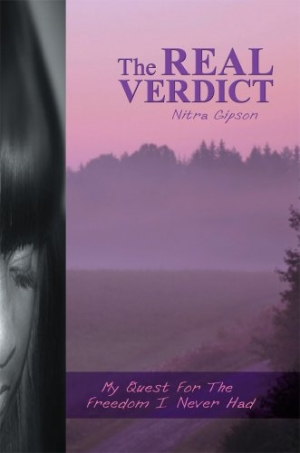The Real Verdict
My Quest for the Freedom I Never Had
Every year over three million instances of child abuse are reported, and five children die every day from child abuse. These are just some of the hard, nauseating facts that debut author Nitra Gipson delivers in her memoir The Real Verdict: My Quest for The Freedom I Never Had.
What makes this memoir of child abuse different is that at age eleven, Gipson considered what she had seen about victims and their legal recourse on television and realized she had become “more aware of the legal system, its efficacy and effects,” particularly regarding children. Gipson learned that even as a child she had rights, and she would exercise them.
Gipson took control and put an end to her step-grandfather’s violation. Not long after, she saw signs that her younger sister was next in line, and she put a decisive and quick stop to that possibility. Gipson’s faith and fearless strength saved her and Adele, and her hope is that her story will continue to help others. She writes in the introduction, “This is my story, intended to motivate, uplift and inspire.” The memoir achieves those aims, and also provides practical contact information for child abuse agencies and officials.
Each chapter begins with an italicized portion reading much like a journal entry, wherein Gipson’s true voice breaks through with warmth and conviction. She writes at the beginning of the chapter about her Uncle Will who was convicted of murder and executed for the crime when Gipson had just graduated high school in 2003, “I am heir to nothing but the memory of you—and, for me, that is everything.” When the author gives herself permission, she is stunning and poetic.
The reader witnesses a brief moment when the punch-in-the-gut episodes of Gipson’s life come to a close, but the bile rises up again when the author is unfairly arrested. A trial and generous settlement follow, and yet money does not erode Gipson’s dedication to helping others and continuing her personal growth. The enormity of the financial compensation ($9.2 million) is humbly conveyed, giving the reader a sense that though this is a wonderful boon, it is not what Gipson wants to be known for.
Gipson speaks directly and powerfully to readers at the end of the book. “To abuse victims, I say, ‘take back your power!’ Speak out and don’t fall prey to the threat of violence against you or someone you love.” A self-published effort, this memoir would have benefitted from the keen eye of an editor. There are missing words and incorrect usage. When her voice is not plainspoken and direct, pretentiousness creeps into Gipson’s word choice.
A concluding statement makes it perfectly clear that Gipson is on the right path to her “fully integrated life.” Just shy of twenty-eight years old, she has an impressive list of accomplishments, including a degree in Criminal Justice and plans for attending law school. Her goal is to “utilize the legal system in the interest of society and empower others to seize what is rightfully theirs.” Victim no more, Gipson’s voice shines with hope and energy.
Reviewed by
Dindy Yokel
Disclosure: This article is not an endorsement, but a review. The publisher of this book provided free copies of the book and paid a small fee to have their book reviewed by a professional reviewer. Foreword Reviews and Clarion Reviews make no guarantee that the publisher will receive a positive review. Foreword Magazine, Inc. is disclosing this in accordance with the Federal Trade Commission’s 16 CFR, Part 255.

